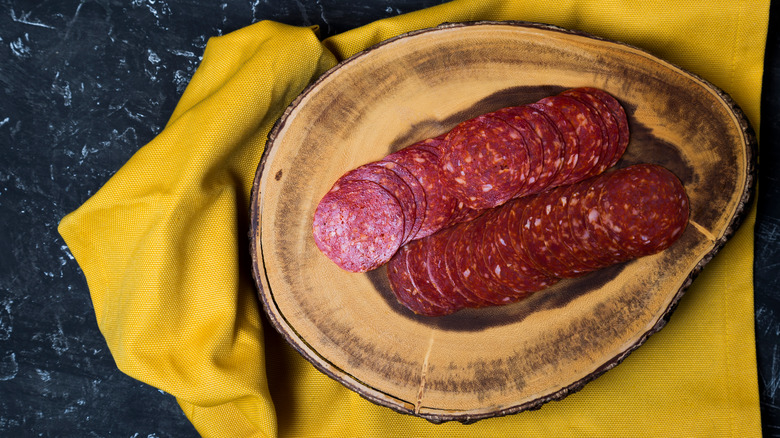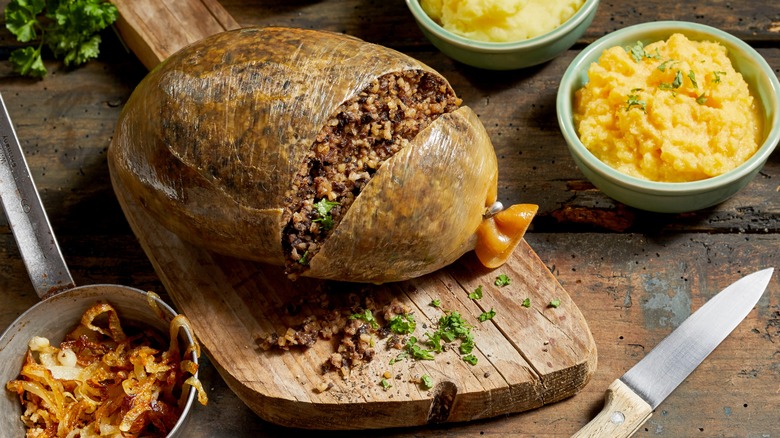Why Pepperoni Rolls Were Once Rumored To Be Illegal In The US
They typically contain just two ingredients, as familiar to your average American as pizza itself: pepperoni and bread. And yet, it has been rumored that pepperoni rolls were once illegal in the U.S., or even that they're still banned in certain states.
To the uninitiated, pepperoni rolls are a mainstay of West Virginia's culinary history, with their origins dating back to the state's mining boom in the 1920s. Italian immigrant miners popularised the pepperoni roll as an easily transportable, shelf-stable lunch. In this sense, it's the Italian-American cousin to Britain's cornish pasty (or "oggie" to the Welsh), which is also believed to have originated as a miners' lunch.
Although the pepperoni roll was never made illegal per se, it did have a run-in with the law in the 1980s which nearly saw these beloved pockets of savory deliciousness regulated out of existence entirely. It seems most likely that this was the inspiration behind rumors that it was banned, or that it still is in some states. However this simply isn't true — in fact, Papa John's introduced a version of pepperoni rolls to their menus nationally back in 2016.
So what happened that nearly put an end to pepperoni rolls?
In 1987, the USDA planned to update its regulations to be more clear about the food safety requirements for meat packaging plants and other food businesses. By this time, the pepperoni roll had made its way into the culinary DNA of West Virginia, with scores of bakeries across the state selling them for retail and wholesale. It caught the eye of the USDA, who included the snack in their regulation proposals.
The proposed new USDA regulations claimed that a pepperoni roll was not a baked good, but a meat product. This would have forced bakeries producing the rolls to be recategorized as meat packaging plants: a reclassification that would have required the bakeries to make incredibly costly changes to their businesses. In essence, if the regulations came into effect, either the bakeries would have to stop making pepperoni rolls, or they'd have to close down shop entirely.
Thankfully for pepperoni roll fans, this never came to pass. West Virginian members of Congress and representatives for the baking industry made a bold case in defense of pepperoni roll-producing bakeries. They were so successful in their defense that the regulations ended up specifically excluding pepperoni rolls from being recognized as meat products. You can still find mention of pepperoni rolls in the USDA's Food Standards and Labeling Policy Book, stating that they "are not considered by consumers to be products of the meat or poultry industry."
Other all-American food controversies
The pepperoni roll's near-demise in the '80s is just one event in the U.S.'s rich history of culinary controversies. First up is the ongoing foie gras debate. Despite its continued popularity in many European countries, animal rights activists have been pushing for a nationwide ban in the U.S. for some time now. A ban on foie gras has been in effect in California since 2012, however in 2020 a loophole opened up allowing it to be consumed in the state if it comes from a seller outside of California. A similar ban in New York was approved in 2019 but has yet to come into effect.
Haggis, however, has been banned in the U.S. since 1971. This is because, in its traditional form, Scotland's national dish contains minced sheep lungs, which are banned for human consumption in the U.S. The ban has led to the emergence of a lung-smuggling black market, with some diehard haggis-lovers returning from Canada with sheep lungs hidden in their suitcases!
Absinthe was banned in the U.S. in 1912 due to a misconception that it had hallucinatory properties. But it was not until almost a century later in 2007 that the potent green liquor was finally legalized.


